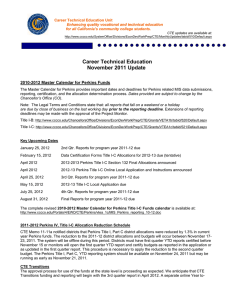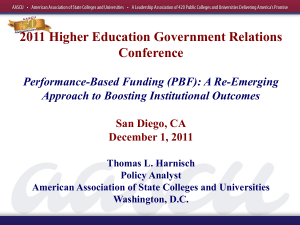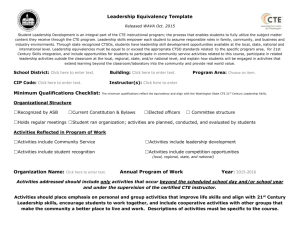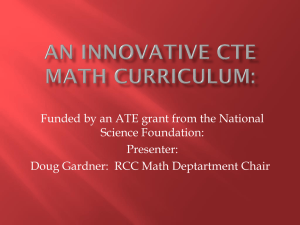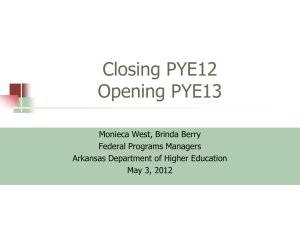Investing in College Access & Completion (April 2012)
advertisement
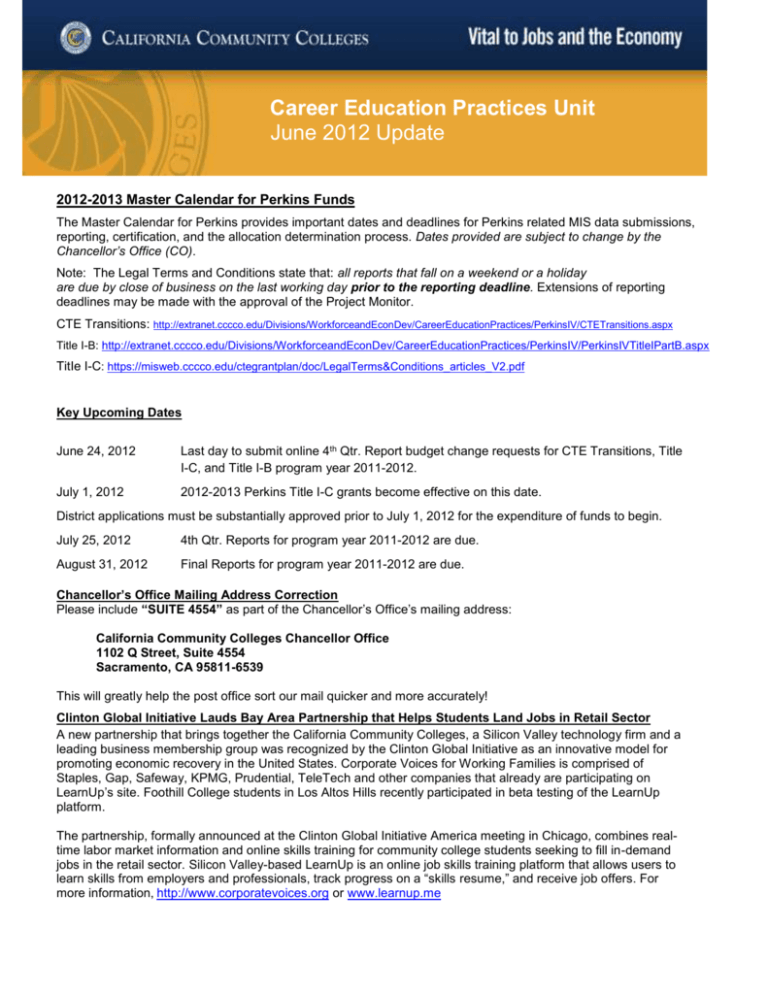
Career Education Practices Unit June 2012 Update 2012-2013 Master Calendar for Perkins Funds The Master Calendar for Perkins provides important dates and deadlines for Perkins related MIS data submissions, reporting, certification, and the allocation determination process. Dates provided are subject to change by the Chancellor’s Office (CO). Note: The Legal Terms and Conditions state that: all reports that fall on a weekend or a holiday are due by close of business on the last working day prior to the reporting deadline. Extensions of reporting deadlines may be made with the approval of the Project Monitor. CTE Transitions: http://extranet.cccco.edu/Divisions/WorkforceandEconDev/CareerEducationPractices/PerkinsIV/CTETransitions.aspx Title I-B: http://extranet.cccco.edu/Divisions/WorkforceandEconDev/CareerEducationPractices/PerkinsIV/PerkinsIVTitleIPartB.aspx TitIe I-C: https://misweb.cccco.edu/ctegrantplan/doc/LegalTerms&Conditions_articles_V2.pdf Key Upcoming Dates June 24, 2012 Last day to submit online 4th Qtr. Report budget change requests for CTE Transitions, Title I-C, and Title I-B program year 2011-2012. July 1, 2012 2012-2013 Perkins Title I-C grants become effective on this date. District applications must be substantially approved prior to July 1, 2012 for the expenditure of funds to begin. July 25, 2012 4th Qtr. Reports for program year 2011-2012 are due. August 31, 2012 Final Reports for program year 2011-2012 are due. Chancellor’s Office Mailing Address Correction Please include “SUITE 4554” as part of the Chancellor’s Office’s mailing address: California Community Colleges Chancellor Office 1102 Q Street, Suite 4554 Sacramento, CA 95811-6539 This will greatly help the post office sort our mail quicker and more accurately! Clinton Global Initiative Lauds Bay Area Partnership that Helps Students Land Jobs in Retail Sector A new partnership that brings together the California Community Colleges, a Silicon Valley technology firm and a leading business membership group was recognized by the Clinton Global Initiative as an innovative model for promoting economic recovery in the United States. Corporate Voices for Working Families is comprised of Staples, Gap, Safeway, KPMG, Prudential, TeleTech and other companies that already are participating on LearnUp’s site. Foothill College students in Los Altos Hills recently participated in beta testing of the LearnUp platform. The partnership, formally announced at the Clinton Global Initiative America meeting in Chicago, combines realtime labor market information and online skills training for community college students seeking to fill in-demand jobs in the retail sector. Silicon Valley-based LearnUp is an online job skills training platform that allows users to learn skills from employers and professionals, track progress on a “skills resume,” and receive job offers. For more information, http://www.corporatevoices.org or www.learnup.me REPORTS AND STUDIES California's Economic Payoff: Investing in College Access & Completion (April 2012) The report documents the economic return to the state of California for every $1 it invests in public higher education, finding that the state will reap $4.50 from taxes on the increased earnings of college graduates and lower costs for providing other state safety net services and incarceration. That's a net return of 450 percent. The report also captures the significant economic return for students who graduate versus attend but never complete at a CSU or UC, and documents their personal payoff. All findings are disaggregated by race/ethnicity. http://www.collegecampaign.org/resources/our-publications/ Download the Key Findings Read the Full Report Measuring Institutional Conditions that Support Student Success in the California Community Colleges (May 2012) This new report, prepared by IHELP for the University of California All Campus Consortium on Research for Diversity (UC/ACCORD), looks at the opportunities and challenges in measuring institutional conditions that support student success. The report, part of the Pathways to Postsecondary Success project funded by the Bill & Melinda Gates Foundation, draws from the literature and ongoing research to develop a set of indicators and metrics to assess the institutional conditions related to student success in the California community colleges. The report describes the significant challenges in identifying, defining and measuring indicators of supportive institutional conditions in the community colleges, but offers a list of possible indicators and existing sources of data that could be used as a “starting point” in defining a set that could fairly and accurately capture the conditions at a particular institution. http://www.csus.edu/ihelp/PDFs/R_Measuring%20Institutional%20Conditions_0512.pdf BRIC (Bridging Research, Information and Culture) Technical Assistance Program Inquiry Guide: Improving CTE Programs with Data and Evidence (March 2012) This guide provides information on and a process for engaging faculty in continuous career and technical education (CTE) improvement at the program level. Generally speaking, CTE program improvement means using evidence to identify the points in an occupational program where students may be struggling to participate, perform, persist and/or complete; determine factors that may be contributing to those challenges; select and implement a solution; and assess its impact. Federal Perkins legislation outlines nine areas for program improvement and annually allocates funds to community colleges in support of this process. http://www.rpgroup.org/sites/default/files/BRIC%20Inquiry%20Guide%20-%20Improving%20CTE.pdf From the OVAE Connections Issue #103: Accountability—Rewarding High-Performing Programs Investing in America’s Future: A Blueprint for Transforming Career and Technical Education ushered in the prospect of an era of results-driven CTE. One of the specific reforms proposed in the Blueprint is to reward programs for results, for example, reducing gaps in educational attainment and employment between different groups of students, by linking a portion of available funding to outcomes. There is a variety of ways that results and funding may be linked. One is by performance-based funding (PBF), which several states have voluntarily adopted for their adult education programs. PBF has been adopted in CTE by a small number of states, including Washington, Tennessee, and Pennsylvania. In Washington PBF is not limited to CTE, but also includes programs in both adult and postsecondary education. In 2006, Washington’s decennial strategic master plan for higher education set two important goals, combining traditional student achievement and economic development goals to create a quality higher education system that (1) provides expanded opportunity for more Washingtonians to complete postsecondary degrees, certificates, and apprenticeships, and (2) drives greater economic prosperity, innovation, and opportunity. Also in 2006, the Washington State Board for Community & Technical Education began PBF, using state funds to reward community colleges based on the accumulation of “momentum points” awarded when students achieve specified goals. Washington rewards student progress from wherever students begin and grants more points for gains in pre-college rather than in college-level work. Short term, intermediate outcomes are used to allocate momentum points. Once momentum points are earned, the funding attached to this achievement is added to the college’s base budget. Thus, colleges compete with themselves rather than with one another. Washington’s community and technical colleges increased their performance across all student outcome categories after their “Achievement Points” PBF plan took effect in 2006. PBF led the colleges to link PBF priorities with strategic planning and accreditation activities, and to focus on improving instruction, tutoring, assessment, and advisement. Rewarding performance over process enables states to reward high-performing programs, assist lowperforming programs, and develop and implement their vision of CTE transformation in a way that meets their economic priorities and community needs. Accountability innovations included in the Blueprint build on the initiatives of Washington and several other states by using Perkins funding to encourage efficient resource allocation, greater awareness and attention to state priorities, and a results-oriented education for all students. For further information on PBF in Washington and other states, see the National Governors Association publication Degrees for What Jobs? (www.nga.org/center). Those interested in Performance-Based Funding in Adult Education may follow the hyperlink to the 2007 MPR report to OVAE by that title. UPCOMING EVENTS Summer 2012 Community College Leadership Academy June 10-13, 2012 Location: University of San Diego For more Information: http://www.sandiego.edu/soles/centers/ccla/ 2012 Career Clusters Institute: Setting a New Standard June 18-20, 2012 Location: Omni Shoreham Hotel, Washington, D.C For more information: http://blog.careertech.org/?cat=266 SkillsUSA 48th Annual National Leadership and Skills Conference (NLSC) June 23-27, 2012 Location: Kansas City, MO For more information: http://www.skillsusa.org/events/nlsc.shtml SkillsUSA Techspo June 24-26, 2012 Location: Kansas City, MO For more Information: http://www.skillsusa.org/events/techspo.shtml California Workforce Association 2012 Meeting of the Minds in Monterey September 4-6, 2012 Location: Monterey Marriott Hotel For more information: http://calworkforce.org/home 2012 Student Success Conference October 3-4, 2012 with optional workshops October 5 Location: Hilton Costa Mesa Orange County Sponsored by the Research & Planning Group for California Community Colleges, the Strengthening Student Success conference provides a unique opportunity for a wide cross-section of people to gather and brainstorm ways to strengthen institutional effectiveness and student learning. For more information: http://www.rpgroup.org/events/2012-student-success-conference CCCAOE Fall 2012 Conference October 17-19, 2012 Location: Renaissance Long Beach Hotel 111 East Ocean Boulevard, Long Beach, CA 90802 For more information: http://www.cccaoe.org/conference/FConference.html National Council for Workforce Education (NCWE) October 19-23, 2012 Location: Hyatt Regency Long Beach For more information: http://www.ncwe.org/?page=annual_conference League for Innovation in the Community College STEM Tech Conference October 28-30, 2012 Location: Westin Crown Center and the Sheraton Crown Center Kansas City, MO For more information: http://www.league.org/2012stemtech/ Workforce Leaders Institute: (Working Title) Leadership in the Time of Change November 5-7, 2012 Location: UCLA Conference Center, Lake Arrowhead, CA For more information: http://www.laocrc.com/Pages/default.aspx Community College League of California Annual Convention and Partner Conferences November 15–17, 2012 Location: Los Angeles Millennium Biltmore For more information: www.ccleague.org/convention Association for Career and Technical Education 2012 National Conference Nov. 29-Dec. 1, 2012 Location: Atlanta, GA For more information: http://www.acteonline.org/vision.aspx This is the last edition of the CEP Update until September 2012. CTE Resource Guide: http://extranet.cccco.edu/Divisions/WorkforceandEconDev/CareerEducationPractices/PerkinsIV.aspx CEP Updates are available at: http://extranet.cccco.edu/Divisions/WorkforceandEconDev/CareerEducationPractices/MonthlyUpdates.aspx
